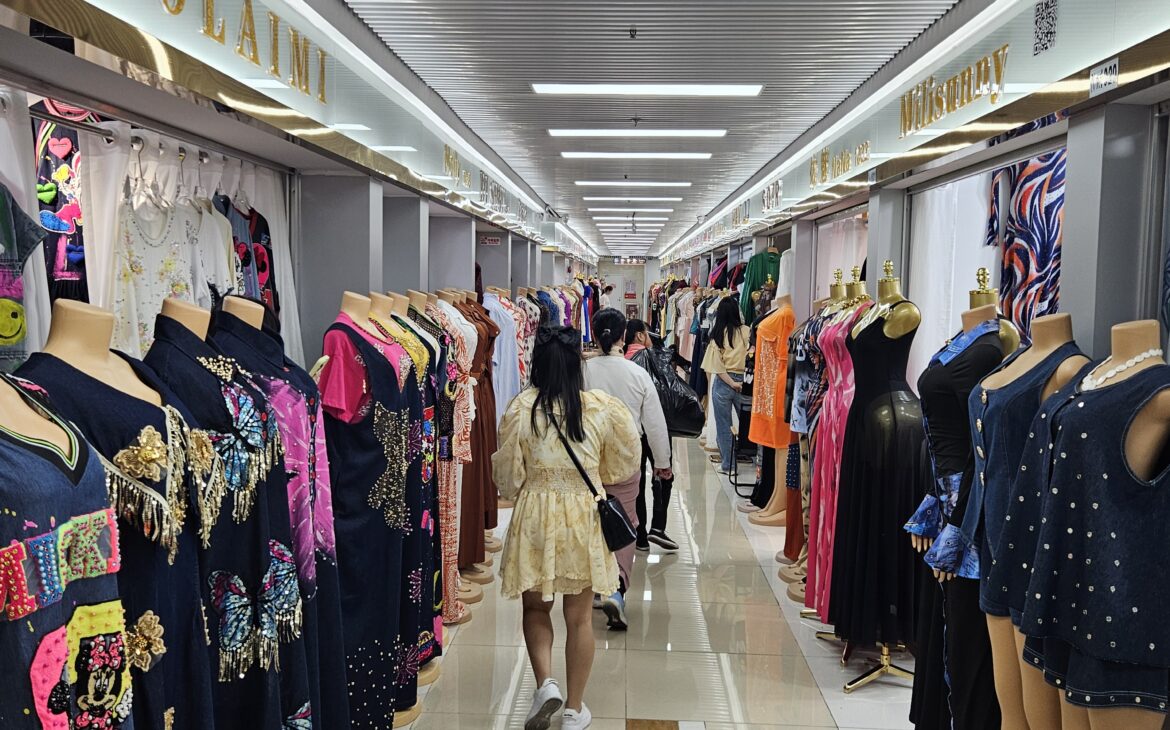Inside Yulong: The African Pulse of China’s Textile Trade

She exuded sleek elegance, her dapper sunglasses—likely a designer label—catching the last light of day as her Mercedes-Benz Maybach glided past. Whether heading home or to some other post-work sanctuary, she moved with the quiet assurance of someone who had conquered the day..
She may have been one of the many stall owners who, by day, command the corridors of Yulong with the precision of seasoned traders and the flair of fashion connoisseurs. Her departure marked the end of another day in a place where commerce never truly sleeps.
Yulong is a place that brings to life the Yoruba adage: Eniti ko le se bi alaaru loyingbo, kole se bi adegboro loja oba—those who cannot hustle abroad will struggle even in the king’s market. Here, hustle is the lingua franca. Deals are struck over WeChat, AliPay, and WhatsApp, often spanning continents and crossing oceans. It’s a digital bazaar with analog soul.
It’s hard to miss—especially for those commuting via the city’s Metro. Emerging from Exit D, one is immediately swept into the rhythm of a bustling complex, a hive of human activity housed within its many buildings. Of course, road access is just as seamless; Didi and taxi drivers know this area well.
This corner of Guangzhou, China, is a remarkable convergence point for African nationalities. As you wander through its corridors and open spaces, you might be forgiven for thinking it’s Pentecost revisited—where every person hears another speak in their own tongue.On this particular day, I found a quiet spot to rest after exploring the shops. Directly across from me sat a man in his late fifties, deep in conversation on a WhatsApp call, his Yoruba flowing fluently across the distance to family and friends. But Yoruba was just one thread in this rich tapestry. French, Akan, Ewe, Anyin, Hausa, Igbo, and countless other languages echoed through the air for anyone willing to listen. It felt like the African Union had come alive—right here, in the heart of Guangzhou.
The shops in Yulong don’t cater to casual shoppers. “How many hundreds do you want?” is the standard greeting. Retail is not the game here—wholesale is king. Nigerian traders, Hausa, Igbo and Yoruba, mingle with counterparts from Ghana, Côte d’Ivoire, Senegal, and beyond. Francophone Africa is well represented, and so are the logistics firms that ensure every bale, box, and container finds its way to the right port.
Just before entering one of the malls, I had seen a massive bale of textile, well wrapped in jute bag and labelled Onitsha. That, I pointed out to my daughter, is likely heading to Ariaria, the largest textile market in Nigeria.
No, this wasn’t a United Nations summit, nor was it an African Union gathering—though the diversity might suggest otherwise. The people here hadn’t come for diplomacy or declarations. They had journeyed in their hundreds, crossing the Indian Ocean with a singular mission: to source textiles and the latest fashion designs from China, and return home to sell them for profit in markets across the continent.
The sting of racism felt in broader parts of Guangzhou—and across China—melts away here, in the presence of real money. Within this vibrant marketplace, profit speaks louder than prejudice. Stall owners, eager to court the steady stream of African buyers, have already picked up the Nigerian lingo—calling out “Sista!” and “Hello Boss!” with practiced ease, hoping to draw customers in. Here, commerce overrides bias. The power of money is undeniable—it softens barriers, reshapes interactions, and, at least for a moment, dissolves the lines that divide.
It’s here that the phrase “my container is on the high sea” takes on tangible meaning. I watched as massive bundles of fabric were tagged with phone numbers and city names, ready to begin their journey across the Indian Ocean.
One could learn a lot by tracing a single piece of cloth from a sewing machine in Guangzhou through its life across transshipment to market stalls nd fashion boutique. All this before “Charity” goes to purchase it to wear to that night party looking like Cinderella.
But Yulong is more than textiles. It’s a microcosm of African life abroad. I saw “Adesuwa”, that sister from Edo State, negotiating with a motorbike rider, her bold makeup and skimpy dress suggesting she’d brought her own brand of hustle to Guangzhou. In the corridors, similarly was a man selling jollof rice with the gusto of a street food vendor in Balogun. “You’re wonderful,” I told him, “selling jollof this far from home?”
Even the food scene reflects the cultural fusion. In one alley, we found a restaurant serving eba and okro soup—owned and operated by a Chinese entrepreneur. It’s a small miracle, a testament to the adaptability and enterprise that defines this district.And then there are the innovators. I met Igbo traders who’ve flipped the script. No longer just buyers, they’ve become suppliers—sourcing directly from Chinese manufacturers and selling to fellow Africans. They’ve carved out their own stalls, rewriting the rules of engagement in this transcontinental marketplace.
Yulong is not just a market. It’s a movement. It’s where Africa meets China—not in boardrooms or embassies, but in the vibrant, chaotic, and deeply human world of trade. And in that convergence, something remarkable is born: a shared economy, a shared ambition, and a shared story worth telling.

